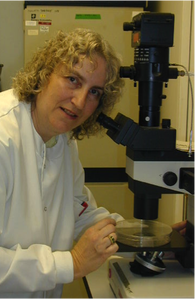Last week I mentioned that a large proportion of biologists believe in God, so it’s time to hear from one of those people. Philippa Darbre is an Associate Professor in Oncology at the University of Reading. She began her career with a degree in biochemistry from Birmingham and then a PhD from Cambridge. After 5 years at the Molecular Medicine Institute, Oxford, and 9 at Cancer Research UK, she joined the University of Reading in 1991. Philippa begins her own story of of relating science to faith with a verse from Psalm 8.
When I consider your heavens,
the work of your fingers,
the moon and the stars,
which you have set in place,
what is mankind that you are mindful of them?
At its essence, science is about observing the world around us, and exploring how it works, or, in my case in cancer research, trying to understand how things can go wrong. The beauty of the night sky is a reminder of the majestic universe in which we live, but for me, life at the cellular level is equally awesome.
I am fascinated by the intricate regulatory processes necessary for control of cell growth, and marvel at the ways in which the genes encoded in DNA can be used to produce the vast array of different cell types, each with their own pattern of gene expression. The focus of my research for the past 25 years has been on investigating the role of oestrogen in breast cancer, and in particular studying the mechanisms by which oestrogen and oestrogen-mimicking chemicals can regulate the growth of human breast cancer cells.
I am saddened that in recent years there has been an assumption that “science” and “faith” must be in conflict, because what gets me excited as a scientist is not in conflict with a loving personal God – it is simply to marvel at His creation. Natural selection has been used as one issue of conflict, and certainly natural selection can be observed at every level.
Oestrogen-deprivation of human breast cancer cells grown artificially in the laboratory forces the cell population to adapt to oestrogen-independent pathways of growth, and my research aims to investigate mechanisms behind this adaptation as a model for failure of hormone therapy in breast cancer. However, life is not always governed solely by the forces of natural selection.
The laws of thermodynamics describe a universe of increasing entropy (decreasing order), but cells are islands of low entropy (or a high level of ‘orderedness’). We are taught in the Bible by God Himself to care for the weak in society, the widow, the orphan, the poor, the sick – those who would be treated harshly by the natural selection process. When Jesus came to die for us, it was so that sin need no longer be the prevailing force but rather that our relationship with God could be restored.
Life is very much a homogeneous mix for me. Science provides some fascinating insights into the “how” of life but I will be forever grateful that Jesus came to show me that there is so much more to life than simply the mechanics of how it works. As a traditional academic, I consider research and teaching to be inseparable, but then so also is my family life and my relationship with Jesus. I know that for the moment “I see only through a glass dimly” but my prayer is that the next faint piece of the image could offer some route to prevention of breast cancer.





